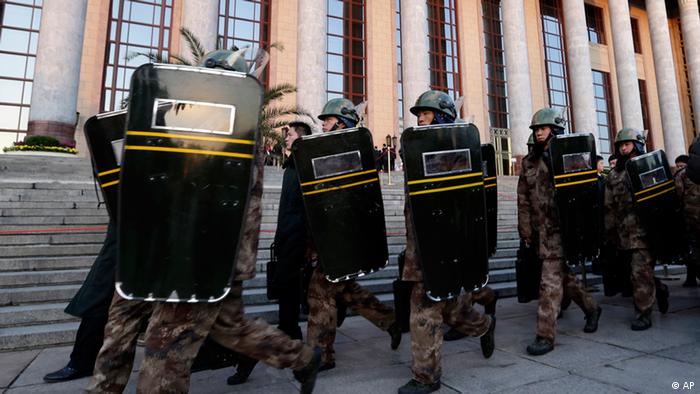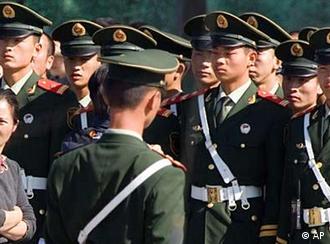
Security measures were tight during China's recent communist party
congress. Petitioners were targeted and at least two of them died for
unknown reasons while in custody.
Zhang Yaodong was beaten up by strangers two weeks ago in a minibus in
Beijing and eventually died from his injuries. Zhang had travelled from
the Henan province in central China to Beijing to lodge a petition
against the government.
Petitioners are a special group in China. They are typically people who feel harassed by local authorities and, out of despair, travel to their local province capital or even Beijing in the hope of voicing their grievances and being heard at a higher level.
But many of them are often arrested by special "security forces" and returned home, while others are temporarily detained in illegal "black jails."
'Black jails'
According to the activist group "Chinese Human Rights Defenders," Zhang and several other petitioners were arrested by the Beijing police and handed over to law enforcement officials in the Henan province. While being transported, Zhang was attacked by several unidentified men and killed.
"Such cases happen again and again," said Hu Jun of the Human Rights Campaign in China, a group that offers support to petitioners. "To keep the petitioners away from Beijing, local officials do everything to send the people back home. Under these circumstances, it's only logical that serious incidents happen."
 Security was tight during the 18th Communist Party Congress
Amnesty International has been observing with concern that the human
rights situation in China has been deteriorating in recent years,"
according to Dirk Pleiter, a Chinese expert with the human rights
organization.
Security was tight during the 18th Communist Party Congress
Amnesty International has been observing with concern that the human
rights situation in China has been deteriorating in recent years,"
according to Dirk Pleiter, a Chinese expert with the human rights
organization.
"Obviously, due to the current uncertainty of the leadership change and also the worsening economic situation in China, authorities have been increasingly violating human rights, as we have seen in actions against political dissidents and human rights defenders."
A further petitioner arrested was Xu Wanxia. She was taken into custody in Beijing on the opening day of the congress. Six days later, the 53-year-old petitioner from the Anhui province was declared dead, according to the Centre for Human Rights and Democracy (ICHRD) in Hong Kong.
Risk of torture and mistreatment
Rights groups such as Amnesty International have deplored the deaths of Chinese prisoners for years. Chinese officials, claims Pleiter, are still unable to sufficiently protect people while they are detained.
"Especially when it comes to illegal forms of detention, the rights of the detainees are practically unprotected," he says. "The risk of torture and mistreatment resulting in death is very high."
According to ICHRD, activists, rights advocates and petitioners tend to be especially targeted before and during the Party Congress, which convenes every five years. Conservative estimates put the number of people affected by this year's crackdown at about 100,000. But most people hear little about the terrible tragedies of people like Zhang and Xu, argues human activist Hu. Press coverage, he says, is taboo.
"Only a few incidents ever make it into the press," he says. "Many petitioners have no contact with each other or other activists. We know a number of people who have not been able to contact anyone outside since their detainment."
Petitioners are a special group in China. They are typically people who feel harassed by local authorities and, out of despair, travel to their local province capital or even Beijing in the hope of voicing their grievances and being heard at a higher level.
But many of them are often arrested by special "security forces" and returned home, while others are temporarily detained in illegal "black jails."
'Black jails'
According to the activist group "Chinese Human Rights Defenders," Zhang and several other petitioners were arrested by the Beijing police and handed over to law enforcement officials in the Henan province. While being transported, Zhang was attacked by several unidentified men and killed.
"Such cases happen again and again," said Hu Jun of the Human Rights Campaign in China, a group that offers support to petitioners. "To keep the petitioners away from Beijing, local officials do everything to send the people back home. Under these circumstances, it's only logical that serious incidents happen."
 Security was tight during the 18th Communist Party Congress
Security was tight during the 18th Communist Party Congress
"Obviously, due to the current uncertainty of the leadership change and also the worsening economic situation in China, authorities have been increasingly violating human rights, as we have seen in actions against political dissidents and human rights defenders."
A further petitioner arrested was Xu Wanxia. She was taken into custody in Beijing on the opening day of the congress. Six days later, the 53-year-old petitioner from the Anhui province was declared dead, according to the Centre for Human Rights and Democracy (ICHRD) in Hong Kong.
Risk of torture and mistreatment
Rights groups such as Amnesty International have deplored the deaths of Chinese prisoners for years. Chinese officials, claims Pleiter, are still unable to sufficiently protect people while they are detained.
"Especially when it comes to illegal forms of detention, the rights of the detainees are practically unprotected," he says. "The risk of torture and mistreatment resulting in death is very high."
According to ICHRD, activists, rights advocates and petitioners tend to be especially targeted before and during the Party Congress, which convenes every five years. Conservative estimates put the number of people affected by this year's crackdown at about 100,000. But most people hear little about the terrible tragedies of people like Zhang and Xu, argues human activist Hu. Press coverage, he says, is taboo.
"Only a few incidents ever make it into the press," he says. "Many petitioners have no contact with each other or other activists. We know a number of people who have not been able to contact anyone outside since their detainment."
沒有留言:
張貼留言